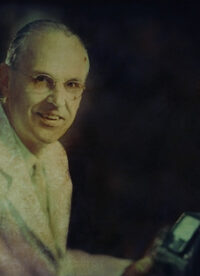W. Barry Wood Collection

W. Barry Wood Jr.
by an unknown photographer
Collection Overview
Creator: Wood, William Barry, Jr. (1910-1971)
Collection Date: 1937-1971
Extent: 28.5 linear feet
Biography
W. Barry Wood was born in Milton, Massacusetts. He received his A.B. from Harvard College in 1932 and his M.D. in 1936 from the Johns Hopkins University School of Medicine. After his internship and residency at Johns Hopkins, Wood returned to Harvard for a year as a National Research Council Fellow in bacteriology. In 1937, he joined the faculty of the Johns Hopkins University School of Medicine as an assistant in medicine. In 1942, Wood was recruited as head of the department of medicine at Washington University in St. Louis and physician-in-charge at Barnes Hospital. In 1943, he was among a group of authors who published one of the earliest papers on the introduction of penicillin. Returning to Johns Hopkins in 1955 to become vice president of the university and hospital, Wood was also named professor of microbiology in the schools of medicine and hygiene and public health. Wood retired as vice president in 1959 to assume directorship of the department of microbiology. He remained in that post until his death in 1971. Wood’s scientific contributions include more than 125 papers and a textbook on microbiology. He was among the first to describe a phenomenon known as surface phagocytosis and did important work on the isolation of pyrogen. Wood received several honorary degrees as well as a number of awards, including a Distinguished Achievement Award from Modern Medicine and the Kober Medal (posthumously). The Basic Science Building on the Johns Hopkins East Baltimore campus is named in his honor.
Scope and Content
The W. Barry Wood Collection spans Wood’s entire career at Johns Hopkins, documenting his contributions to the Johns Hopkins Medical Institutions as a scientist, teacher, researcher, department chairman, and administrator. The collection consists of biographical material, professional and personal correspondence, committee records and minutes, manuscripts, reports, grant applications, budgets, lectures, speeches, laboratory logbooks, motion picture films, photographs, reprints, and scrapbooks. A book by Wood entitled What Price Football is also included. The collection documents the development of microbiology at Johns Hopkins.
